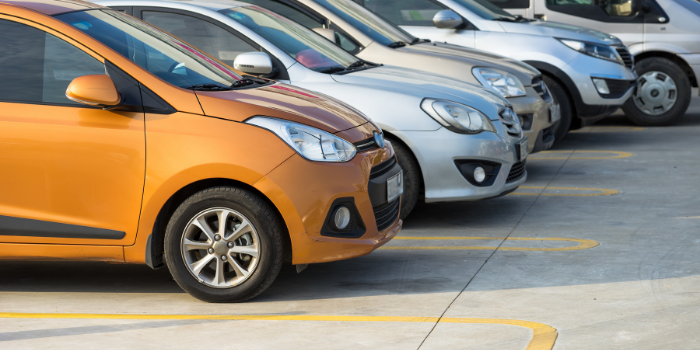Prolonged street parking can turn wide, two-lane neighborhood streets into one-lane streets with two-way traffic. And, if cars don’t have room or visibility to see oncoming traffic, this could also mean more accidents on association roadways. What is an HOA to do? On one hand, some communities just weren’t built with enough parking space in garages and driveways to accommodate more than one or two cars per household, but on the other, it can become quite dangerous to have community streets constantly blocked up by vehicles lining both sides.
In this article, we’ll cover options HOAs have to get community parking under control, as well as some solutions to offer homeowners for their parking problems.
Private or Public Streets?
How much control the community association has over street parking can be largely determined by whether the community’s streets are public or private.
If the community’s streets are private, meaning that the association owns or at least maintains them, then the association has more authority on how, when, where, and if homeowners can park on the streets. However, if the community’s streets are public, meaning that the government owns and maintains then, then the HOA will typically not have much authority concerning street parking.
Even if the association has private streets, state and local law may place restrictions on parking rules and enforcement. On the other hand, the law may also grant community associations authority to adopt and enforce certain parking rules even if the community’s streets are public.
To determine whether your community’s streets are public or private, and what types of parking rules the HOA can enforce, contact the association’s attorney.
For Public Streets
If the streets in the community are public, the association may contact city services (the 311 number) or the local police about illegally parked vehicles, such as vehicles parked in the street that block fire hydrants, fire truck lanes, or a homeowner’s driveway. Parking close to a stop sign is also generally not permitted under the law.
For HOA-Owned Streets
For communities with private streets, the association may adopt and enforce a parking policy that is in line with parking rules included in the CC&Rs. The association’s attorney should assist by drafting these rules to ensure that they are in compliance with the law and are easily understood and enforceable. When adopting a parking policy, these rules must be in line with any parking rules already included in the governing documents.
Association parking rules should also be clear and specific. If a rule prohibits overnight parking, it should state the times that parking in the street is prohibited, such as: “Parking on association streets is prohibited between 11:00 p.m. and 5:00 a.m.”
Because parking violations are difficult to track, as compared to trashcan violations or unapproved improvements, they are difficult to enforce fairly and equally unless someone is consistently driving the neighborhood.
Fair enforcement and accurate recordkeeping are especially important if the association has a towing policy so that cars that haven’t actually broken the rules aren’t towed and owners are warned of an impending tow the required number of hours beforehand. Towing vehicles may also involve other requirements, such as reporting the tow to the local police department, that should be examined with the association’s attorney before adopting or enforcing towing rules.
If the community is not small, enforcing parking and towing rules will be a time-consuming and complicated task and may require the HOA to hire a company to complete the community violation drives and enforcement actions.
Solutions to Parking Problems
Whether or not your association can enforce parking rules and regulations, it’s always a good idea to offer helpful solutions to parking issues homeowners may be having. For instance, some communities just weren’t built with driveways or garages that can accommodate more than one vehicle, and many households have two adults who need to drive to work each day to support the family.
Even communities with lots that can easily accommodate two vehicles can run into issues when the children in the neighborhood become teens and get their own cars to go to school and work. Then, there are holiday gatherings, baby showers, bridal showers, weddings, and a host of other important life events that people usually host in their homes or that may involve relatives and close friends staying late or even spending the night.
To avoid the community streets from being turned into undrivable parking lots, here are some tips that the board can pass on to homeowners:
Reclaim the Garage
Before hosting a party or having overnight guests, homeowners can create extra parking space by clearing out the garage. This will allow homeowners to park their own vehicles in the garage and let their guests use the driveway. You could also share the community rules for building backyard sheds to give the displaced storage somewhere to go.
Carpool
During those high guest traffic times, you could advise homeowners to ask their guests to carpool, take a bus, or use Uber. You could couple this request with the board’s goal of keeping the streets safe, so that drivers can see pedestrians and other drivers, and that cars coming from opposite directions can pass each other.
Offer Common Area Parking
Open common area parking, such as the pool parking lot, as guest parking during high guest traffic times. Since the pool is typically closed during the holiday season, offering the lot to Thanksgiving guests wouldn’t interrupt homeowners’ use and enjoyment of the pool.
Grant Variances
If a homeowner has a justifiable issue caused by the size of their driveway and seeks to widen it, consider granting them a variance to extend their driveway by a reasonable number of square feet. For instance, a member may have an unusually small or narrow driveway for the neighborhood.
The association can grant variances with restrictions, so it can limit how much a driveway may be extended and where the extension may be placed. If driveway size limits are a significant issue for enough members of the community, another thing the association may want to consider is amending the governing documents to allow for wider driveways.
Solving potentially dangerous street parking issues can require some careful forethought and planning from board members. But, by balancing specific, equally enforced rules with helpful solutions to ease the claustrophobia of cramped neighborhoods, you can clear the streets and give the community room to breathe.
If you have any questions about handling HOA Parking for your community reach out to a JellyBird representative. We’d be happy to help! If you are in need of an HOA management company that specializes in larger communities (200+ homes) contact Spectrum Association Management today.

